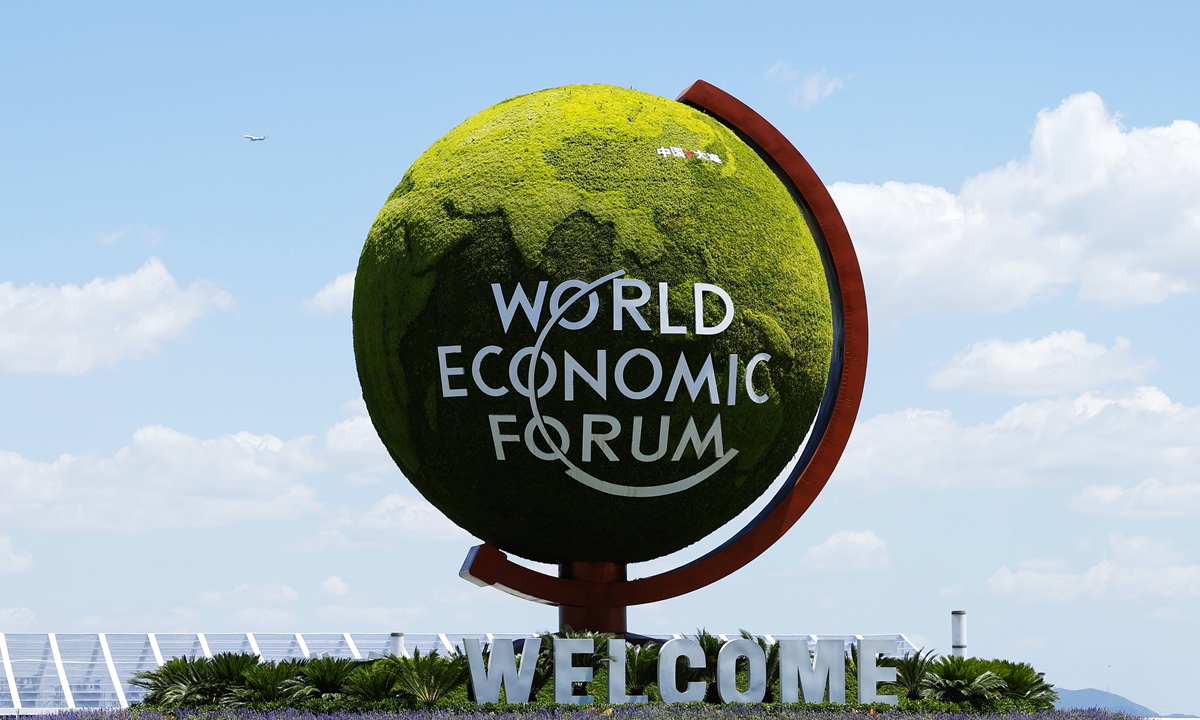Over 1,600 representatives from the political, business, academic and media communities of close to 80 countries and regions stand ready to gather in Dalian, Northeast China’s Liaoning Province, to participate in the 15th Annual Meeting of the New Champions, also known as Summer Davos, to contribute their ideas to help stimulate a new momentum for world economic development.
This marks the return of the Summer Davos to Liaoning after a five-year hiatus, with record numbers of venues and guests. This year’s forum, held from Tuesday to Thursday, will serve as an important window to observe and understand China’s economy and politics, as well as an international communication platform to better grasp the development trends and opportunities in the global economy, forum participants and Chinese experts said on Monday.
They also noted that at a time when global challenges such as climate change and food and energy security are increasing, coupled with a complex international situation and weak global economic recovery, this forum once again showcases China’s stance on open cooperation and mutual benefit, including in the development of emerging fields such as new energy and artificial intelligence. This openness stands in stark contrast to the increasing protectionism in the US-led West.
Chinese Premier Li Qiang will attend the Summer Davos on Tuesday and deliver a special address at the meeting. He will also meet with Executive Chairman of the World Economic Forum (WEF) Klaus Schwab and foreign guests, and have a conversation with representatives of the foreign business community.
President of Poland Andrzej Duda and Prime Minister of Vietnam Pham Minh Chinh will also attend the meeting.
Gathering impetus
Dalian is the birthplace of the Annual Meeting of the New Champions of the WEF, as the first forum was held in Dalian in 2007. This will be the eighth time that the meeting has been held in Dalian.
A feeling of excitement can be felt upon arrival in Dalian, as billboards and posters advertising the forum can be seen at the railway station and along the main avenues around the conference venue, Dalian International Convention Center.
Similarly, at the registration center, the cars coming and going and the steady stream of people showed that the city has been ready for the three-day event.
On the way to Dalian, a young participant from Argentina told the Global Times that despite the long journey, her enthusiasm for attending the conference has not been dampened. “Unlike the forum held in Davos, Switzerland, the Summer Davos involves more young people, and the world needs to hear their voices,” she said, adding that this was her first visit to China and that despite the short time she had been here, she was already impressed by the modernization and the friendly residents.
“The theme of this year’s conference is ‘Next Frontiers for Growth,’ which is relevant to young people and the future,” she noted.
The international community is now facing a complex situation, which makes it all the more necessary to have a communication and dialog platform like the WEF to build bridges for all parties to cooperate and solve problems on a global scale, Chen Liming, Chair of Greater China at the WEF, said during a press conference on June 18.
“The Summer Davos meeting, as an international platform for exchange, provides us with an opportunity to cooperate with the world. It also helps us understand the trends and opportunities in the global economy,” Wang Peng, an associate researcher at the Beijing Academy of Social Sciences, told the Global Times on Monday.
The discussion of economic recovery of China and the world will be prioritized during the Summer Davos, as well as the global environment and conditions for further growth amid regional conflicts, Cao Heping, an economist at Peking University, told the Global Times on Monday.
“As a major mid-year international forum, participants of this Summer Davos should focus on foster new growth engines by promoting more regional economic cooperation. And it is also important to discuss how to ensure a steady global development environment by minimizing the impact of the wars,” he said.
While there are many important aspects worth noting at this year’s Davos, certain sectors such as global trade and green transformation are particularly noteworthy for world development. This is especially true against the backdrop of rising challenges due to intensified protectionism from certain Western countries, experts said.
Currently, free trade is facing significant challenges due to rising protectionism, leading to the restructuring of global supply chains and industrial chains, which is a very serious problem, Li Chang’an, a professor from the Academy of China Open Economy Studies at the University of International Business and Economics, told the Global Times on Monday.
“Globalization underscores the importance of free trade. Despite the challenges, it is only by continuing to adhere to the path of free trade that the world can share in the opportunities presented by China’s development, and jointly we may promote common development for all,” Li said.
Leading role
China has made significant contributions to leading global sustainable economic development and there is a growing expectation on how China will play an even greater role in the global economy and establish closer cooperative relationships with other countries, experts said.
“As the world’s second-largest economy, China remains the largest contributor to global economic growth and has demonstrated strong influence in areas such as technological innovation, environmental protection and social governance,” Chen said during the press conference.
China has made remarkable progress in green energy development such as in the electric vehicle sector. By sharing and promoting these technologies, China can help other countries achieve low-carbon transitions and jointly address climate changes, Wang noted.
At the same time, China’s successful experiences in poverty reduction, education, and healthcare offer valuable lessons for other developing countries. Wang said that by sharing these experiences at the forum, China shows its willingness to continue making substantial contributions to global sustainable development.
In May, China’s three major economic indexes saw stable growth, with industrial output rising 5.6 percent year-on-year. Cao stated that some international financial firms once said China’s economic growth may slow down in the first half of 2024, however, the nation’s retail sales of consumer goods saw a 3.7 percent year-on-year increase, demonstrating great consumption demand, and the tourism-related consumption in multiple holidays also echoed the market vitality.
Moreover, many international institutions have raised their projections on China’s 2024 economic growth. Barclays on Monday raised China’s GDP growth for 2024 from the previous 4.4 percent to 5 percent, following the release of better-than-expected GDP figures in the first quarter.
Previously, the IMF also raised its forecast for the country’s economic growth in 2024 to 5 percent from the April projection of 4.6 percent, driven by a strong first-quarter GDP growth in 2024 and recent policy measures.
According to Cao, a 5.0 to 5.5 percent of GDP growth for 2024 is reasonable. “China’s economy covers nearly all industries with rapidly increasing scale and technology innovation, and a stable central government makes the country’s economic growth quite promising,” he said.














